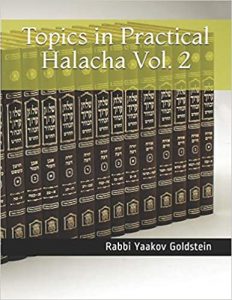*As an Amazon Associate I earn from qualifying purchases.
Preventing monetary damage from occurring to another:[1]
If one is able to save his friend from a possible monetary loss, he is obligated to exert as much effort possible, with all his bodily strength, to try to prevent the loss.[2] Doing so is a positive command and is included in the Mitzvah of Hashavas Aveida.[3]
Example-Prevent flooding:[4] One who sees [a stream of] water threatening to flood the field of his friend, or to destroy his home/building, is obligated to build a fence in front of the water [to block it] on their behalf [if the friend is not around and is thus unable to do anything to prevent the damage].
Must one spend money to prevent the loss?[5] One is not obligated to spend money in order to help prevent monetary loss from his friend’s property unless he is certain that his friend will reimburse him for his expenses.
Must one help save his friends property if he is in middle of work:[6] If one is in middle of work and stopping to help save his friends property will cause him financial loss, or to lose a profit in business, then he is not obligated to do so.[7] Nevertheless, a person is to go beyond the letter of the law and not be so particular and say that my loss comes first. If one is always particular to precede his own potential loss then he removes upon himself the yoke of Gemilus Chassadim and in the end will become of need of the public [for charity]. Nevertheless, if one has a certain and clear loss that will come as a result of saving the property, his loss comes first.[8]
A Mumar:[9] One is required to save one’s friend’s property or item from damage even if one’s friend is a Mumar Leteiavon, and a Baal Aveiros.[10] If however the Jew is an idol worshiper, or desecrates Shabbos in public, or is an Apikores who does not believe in the Torah and prophecy, then it is forbidden to help save his item.[11]
A gentile:[12] One is not required to help prevent damage from occurring to the property of a gentile, unless there will be a Chilul Hashem involved in not doing so.
Summary: If one is able to save his friend from a possible monetary loss, he is obligated to exert as much effort possible, with all his bodily strength, to try to prevent the loss. He however is not obligated to spend money in order to help prevent the monetary loss unless he is certain that his friend will reimburse him for his expenses. One is not required to help prevent damage from occurring to the property of a gentile or a Mumar Lehachis and Apikores. Q&A If one saw a person shoplifting in a Jewish owned store, must he inform the owners? Yes, as stated above! This applies even if the shoplifter is a Jew and is of young age and may be arrested for his actions. |
_________________________________________________________________________________________________________________
[1] Admur Hilchos Metzia 33
[2] Admur Hilchos Metzia 33; Nizkei Mamaon 5
The reason: As the verse states “Lechol Aveidas Achicha”, this is coming to include a loss of land and any matter of the like. [Admur ibid; Smeh 259/21; Baba Metzia 31a]
[3] Nizkei Mamaon 5
[4] Admur ibid; Michaber 259/9; Baba Metzia 31a
[5] Admur Hilchos Metzia 33; Nizkei Guf Vinefesh 8; See Michaber and Rama 265/1; Smeh 264/18 and 426/1; Sanhedrin 73a
[6] Admur Hilchos Metzia 33-34
[7] Admur Hilchos Metzia 33; Michaber and Rama 265/1; Smeh 264/18 and 426/1; Sanhedrin 73a
The reason: As one is not obligated to spend money on behalf of saving his friends property unless he knows his friend will reimburse him, and perhaps in this case his friend will not reimburse him for his lost income. [Admur ibid]
[8] Admur Hilchos Metzia 34; Michaber 264/1; Baba Metzia 33a
[9] Admur Hilchos Metzia 39; Nizkei Guf Vinefesh 8; Avoda Zara 26b
[10] The reason: As the verse states “Lechol Aveidas Achicha” and the Sages expounded that this is coming to include the items of a Mumar Liteiavon. [Admur ibid]
[11] Admur Hilchos Metzia 39; Avoda Zara 26b
[12] Admur Hilchos Metzia 38 regarding returning a lost object


 Donate
Donate
Leave A Comment?
You must be logged in to post a comment.